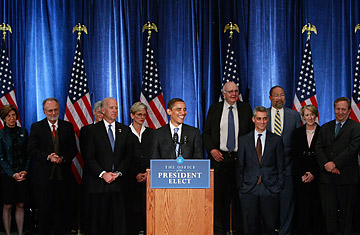
President-elect Barack Obama holds his first post-election press conference at the Hilton Hotel.
Perhaps the most striking thing about Barack Obama's first press conference as president-elect was how, well, presidential it was.
In a nod to the formality of the occasion journalists and staff alike shed the jeans they'd been living in through the final weeks of the campaign and ironed out their wrinkled suits and skirts. The seating was assigned, with the names of news agencies scrawled on pieces of paper and taped to the backs of chairs, a first for the Obama organization. Reporters asked one another before hand if it would be appropriate to type notes as he spoke, as we always did when he was just a candidate. The answer quickly became clear: not a single computer remained on for the press conference.
Obama, uncharacteristically late in that presidential way where aides keep giving two minute warnings of his approach, slid into the formal role as easily as sliding back into a suit after working out at the gym. The president-elect delivered his first press conference with verve, as clear and articulate as ever, standing before a plain blue background and a row of U.S. flags that evoked the White House and the backdrop for his victory speech Tuesday night. His economic advisers and new chief of staff Rahm Emanuel flanked him (he had just come from meeting with them), many smiling and nodding encouragingly, not unlike parents proudly watching their kid deliver a valedictory speech. He called on reporters by their names from a card — a rarity for Obama, who in press conferences usually just points and says "yes" — even going so far as to use the order similar to that used by President Bush: the wires first, then the networks, the hometown Chicago reporters, and then the major papers. In another notable departure from the campaign, journalists formally stood to pose their questions.
On a day when new unemployment figures and auto maker losses revealed the depth of the country's economic woes, Obama was appropriately sober and brief, focusing most of his opening statement on his determination to pass a stimulus package and get the economy moving again. "It is not going to be quick and it is not going to be easy for us to dig ourselves out of the hole that we are in, but America is a strong and resilient country," he said in his opening statement. But the president-elect did seem in great spirits, joking with a small group of reporters who attended the beginning of the meeting with economic advisers. And he allowed himself a few light-hearted moments, laughing about a inquiry as to which kind of dog his daughters might be getting for the move into the White House.
"With respect to the dog, this is a major issue. I think it's generated more interest on our website than just about anything," Obama deadpanned. "We have — we have two criteria that have to be reconciled. One is that Malia is allergic, so it has to be hypo-allergenic. There are a number of breeds that are hypo-allergenic. On the other hand, our preference would be to get a shelter dog. But obviously, a lot of shelter dogs are mutts, like me. So the — so, whether we're going to be able to balance those two things, I think, is a pressing issue on the Obama household."(See pictures of Presidential First Dogs.)
Obama also said he's spoken with all "living" presidents, joking that "I didn't want to get into a Nancy Reagan thing about, you know, doing any seances." He must have been taking advice on how to handle the press from those former leaders of the free world, as Obama did his best to make no news. Has he been given pause on any of his foreign policy positions now that he is receiving full intelligence briefings? "I'm going to skip that." Would he still raise taxes on those making more than $250,000 a year? "My tax plan represented a net tax cut. It provided for substantial middle-class tax cuts. Ninety-five percent of working Americans would receive them." How soon will he send low-level envoys to countries such as Iran, Syria, Venezuela, Cuba, to see if a presidential-level talk would be productive? "Obviously how we approach and deal with a country like Iran is not something that we should, you know, simply do in a kneejerk fashion."
Indeed, if one message was prevalent despite the formal, White House-esque atmosphere, it was: I am not president yet, I'm not rushing into anything, and I won't be baited into saying anything I will regret. From picking his cabinet ("I think it's very important in all these key positions, both in the economic team and the national security team, to — to get it right and — and not to be so rushed that you end up making mistakes.") to getting involved in economic policy during the lame duck session, Obama's answer time and again was: "We only have one president at a time." Clearly, at least until he is that president (and likely even after that), journalists will have to think harder of ways to pry new information from him.
